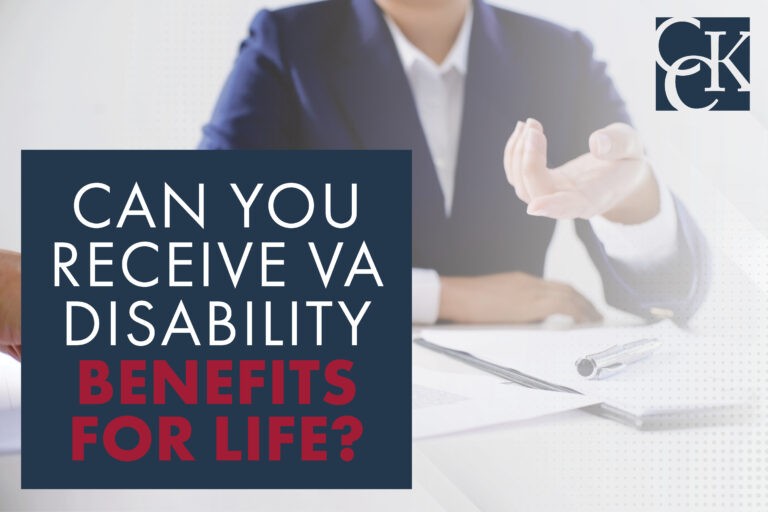Can You Receive VA Disability Benefits for Life?

CCK Law: Our Vital Role in Veterans Law
Yes, it is possible to receive VA disability benefits for life. However, you are not guaranteed VA disability benefits for life.
What Are VA Disability Benefits?
VA disability compensation is a tax-free monetary benefit paid to veterans with disabilities caused or aggravated by their military service. Disabilities eligible for compensation can be physical injuries or illnesses (e.g., cancer or type 2 diabetes) or a mental health condition (e.g., PTSD or depression).
To qualify for disability benefits from the Department of Veterans Affairs (VA), veterans must first establish service connection, which entails evidence of these three things:
- An in-service event, injury, or illness;
- A current diagnosis of a disabling condition by a medical professional; and
- A nexus, or link, between the in-service event and current disability.
How Long Do VA Disability Benefits Last?
Veterans can receive VA disability benefits for as long as their service-connected injury or illness is assigned a compensable rating. This means that VA can reduce or revoke a veteran’s disability benefits if it deems their condition has improved.

To ensure a veteran’s disability rating accurately reflects their current condition, VA may schedule periodical reexaminations, or compensation and pension (C&P) exams. The frequency of reexaminations depends on whether VA thinks a veteran’s condition is likely to improve. VA uses C&P exams to determine if their service-connected condition still warrants the same disability rating.
VA typically reexamines veterans two to five years after their initial examination. If VA determines a veteran’s condition is “static” (i.e., unlikely to improve), it is unlikely they will be reexamined, and their disability rating will remain the same.
Are VA Disability Benefits for Life?
As mentioned, while it is possible to receive VA disability benefits for life, veterans are not guaranteed VA disability benefits for life. However, there are a few situations in which VA disability benefits are considered permanent.
Permanent and Total Disability
Permanent and total disability, or P&T, refers to veterans whose disabilities are total (rated 100 percent disabling by VA) and permanent (zero or close to zero chance of improvement). If VA has deemed your condition permanent and total, you are entitled to lifetime benefits. P&T ratings are protected from being reevaluated or reduced.

20-Year Rule: Continuous Ratings
If you have had a disability rating for 20 years, VA cannot reduce your rating below your original disability rating unless the rating was based on fraud. This is known as the VA 20-year rule.
For example, say a veteran was initially rated at 50 percent for a service-connected disability and over 20 years it fluctuates between 50 and 70 percent disabling. After the 20-year mark, VA must continue to rate the veteran’s condition at least 50 percent for the remainder of their life.
Other Protected VA Benefits
There are several situations in which a veteran’s benefits are protected, although not fully exempt from being revoked or reduced in the future. These are known as VA-protected ratings.
100% VA Ratings
If VA assigns a 100 percent rating, it cannot be reduced unless material evidence shows a significant improvement in the veteran’s ability to function on a day-to-day basis.
VA Disability 5-Year Rule
The VA disability 5-year rule states that a disability rating can only be reduced after five years if VA obtains medical evidence indicating the veteran’s condition is substantially improving over time on a sustained basis.
VA’s Disability 10-Year Rule
The VA disability 10-year rule states that VA cannot revoke service connection—and thus cannot fully terminate benefits—unless there is evidence of fraud.

Veterans Over Age 55
Veterans who are over the age of 55 are protected from VA rating reevaluations in many situations. These are case-by-case determinations.
Is TDIU Permanent?
VA grants Total Disability based on Individual Unemployability (TDIU) benefits to veterans who are unable to obtain or maintain substantially gainful employment due to their service-connected disabling condition.
If VA obtains evidence that a veteran may have sustained substantially gainful employment—such as Social Security Administration wage reports—then it may request that the veteran fill out VA Form 21-4140, Employment Questionnaire. If the veteran does not respond to the request and provide evidence that they are staying within VA’s eligibility requirements, then they may lose TDIU benefits.
VA Must Notify You Before Reducing or Revoking Your Benefits
If VA sees fit to reduce or rescind your benefits, it must first provide you with notice. Then, VA must allow you time to submit arguments or evidence as to why your rating should not be reduced or severed. If VA fails to issue you this notice before reducing or taking away your benefits, you can argue the reduction or severance was improper.
Call Chisholm Chisholm & Kilpatrick Today
The veterans’ advocates at Chisholm Chisholm & Kilpatrick LTD are committed to helping veterans win the VA disability benefits they deserve. Call CCK today at 800-544-9144 to discuss your case with a member of our team. We offer free case evaluations.
Share this Post